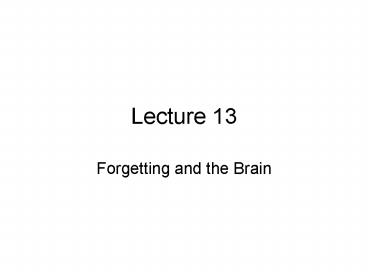Forgetting and the Brain - PowerPoint PPT Presentation
1 / 28
Title:
Forgetting and the Brain
Description:
Amnesia: Physiological causes of forgetting. Retrograde amnesia disrupts previous memories ... State dependent retrieval. Hypermnesia improval of memory over time ... – PowerPoint PPT presentation
Number of Views:142
Avg rating:3.0/5.0
Title: Forgetting and the Brain
1
Lecture 13
- Forgetting and the Brain
2
What is the best way to study for an exam?
- Distributed practice (studying over time)
- Massed practice (cramming in 1 or 2 days)
- All-nighters (cramming in 1 or 2 hours)
3
Remembering exactly where you were and what you
were doing on 9/11/2001 is an example of
- Intentional learning
- Elaborative encoding
- A flashbulb memory
- Depth processing
4
Summary Differences between memory models
- Ways information gets stored
- Rehearsal
- Attention
- Deep Processing
- Strong Emotion
5
Objectives
- Consider how people study forgetting
- Consider major theories of forgetting
- When retrieval goes wrong
- Consider mnemonics to reduce forgetting
- Consider what happens in the brain during memory
and forgetting
6
Retrieving information
- Recognition matching stimuli to a stored
representation (like multiple choice) - Recall the act of intentionally bringing stored
representations to awareness (short answer) - Which is easier?
7
Demonstration
- Recall and Recognition
8
What Causes Forgetting?
- Decay
- Theory that memories fade over time because
relevant connections between neurons are lost - Interferences
- Theory that the disruption of the ability to
remember one piece of information is caused by
the presence of other information - Retroactive New information interferes with old
- Proactive Old information interferes with new
9
Other factors related to forgetting
- Encoding failures
- Intentional forgetting
10
Amnesia Physiological causes of forgetting
- Retrograde amnesia disrupts previous memories
- Infantile amnesia
- Anterograde amnesia leaves already consolidated
memories intact but prevents the learning of new
facts - Patient H.M.
- Movie Memento
11
Using Cues
- Cues stimuli that help you remember
- Tip of the tongue phenomenon (demo)
- Encoding specificity
- State dependent retrieval
- Hypermnesia improval of memory over time
12
Retrieval More Than the Past
- False memories
- In the Bugs Bunny study, Loftus talked with
subjects about their childhoods and asked not
only whether they saw someone dressed up as the
character, but also whether they hugged his furry
body and stroked his velvety ears. In subsequent
interviews, 36 percent of the subjects recalled
the cartoon rabbit.
13
Demonstration
- Productions of false memories
14
False Memories Loftus and colleagues (1978)
People watched a series of slides that showed a
red Datsun stopping at a stop sign and then
proceeding into an accident Participants were
asked Did another car pass the red Datsun while
it was stopped at the stop sign? OR Did
another car pass the red Datsun while it was
stopped at the yield sign?
15
The Repressed Memory Debate
- Are they real memories that are forced out of
consciousness and then later emerge, as
hypothesized by Freud, or are they false
memories? - Evidence is mixed
16
Improving Memory
- Depth and breadth of processing
- Transfer appropriate processing
- Distributed practice
- Mnemonic devices
- Visualize interacting objects
- Method of loci
- Peg word system 1 is a bun
- Acronyms (NOW), Initialisms (VFW), Sentences My
very educated mother
17
Biological Foundations
- The role of the hippocampus
- Supporting evidence HM (and others)
- Stress and memories
18
Biological Foundations
- The role of the hippocampus
- Supporting evidence HM (and others)
- Stress and memories
- The role of other sub-cortical structures
- Imaging techniques
- Modality differences
- Implicit and explicit differences
19
The search for the engram
- The role of the cortex
- Brain stimulation
- Brain removal
20
Consolidation
- The process of forming a relatively permanent
memory trace - Long-term potentiation (LTP) is the strengthening
of the connections between the sending and
receiving neurons that underlies memory storage
21
Biological Foundations of Memory
- Human genes clearly play a role in memory
- The apolipoprotein E (apo E) gene is present in
many people who develop Alzheimers disease
22
Video Clip Implicit v Explicit Memory
- 18. Living With Amnesia The Hippocampus and
Memory
23
Multiple choice exams are testing
- Recall
- Recognition
- Storage
- Hypermnesia
24
If you decide to study while drinking, how should
you take your test?
- While drinking
- Sober
25
Do you believe in false memories?
- Yes
- No
26
Jamie uses the acronym HOMES to remember the
names of the Great Lakes. Jamie is using
- a mnemonic
- chunking
- rehearsal
- method of loci
27
Can you diagnose this man?
- Ed is conked on the head with a baseball. While
he is able to recall events BEFORE he was hit on
the head he is unable to formulate new memories.
28
What is Ed suffering from?
- Anterograde amnesia
- Retrograde amnesia
- Retroactive interference
- Repressed memories









![[PDF] DOWNLOAD Brain Of Thrones: A Game Of Thrones Quiz Book PowerPoint PPT Presentation](https://s3.amazonaws.com/images.powershow.com/10092688.th0.jpg?_=202408060211)





















